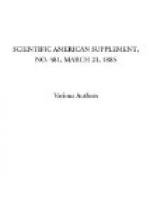As an illustration of the intense heat we experienced, I may mention that it was at one time perfectly impossible to make the thermometer budge. The temperature of the blood is about 97 or 98 degrees, and if the temperature of the air be below the temperature of the blood, of course when the hand is applied to the thermometer the mercury rises. In one of our journeys up the Pennsylvania Road we tried to make the thermometer budge as usual, but could not, which proved that the temperature of the air inside the Pullman car in which we traveled was the same as that of the blood.
The American Association is of course based on the British Association. Its mode of administration is a little different. It is divided into sections, as is the British Association, but the sections are not called the same. For instance, in the British Association, Section A is devoted entirely to physics, but in the American Association, Section A is devoted to astronomy and Section B to physics. In the British Association, Section G is devoted to mechanics, but in America Section D is devoted to that subject. But with the exception of just a change in the names of some sections which are familiar as household words to members of the British Association, the proceedings of the American Association do not differ very much from ours. They have, however, one very sensible rule. The length of every paper is indicated upon the programme of the day’s proceedings, and the continuation or the stopping of any discussion on that paper is in the hands of the section. For instance, if the President thinks that a man is speaking too long, he has only to say, “Does the meeting wish that this discussion shall be continued, or shall it be stopped?” A majority on the show of hands decides. Such a practice has a very wholesome effect in checking discussion, and I certainly think that some of our societies would do well to adopt a rule of the same character.
The meeting of the American Association, again, was not distinguished by any particular electrical paper, or any new electrical subject. The main subject that was brought before us was the peculiar effect called “Hall’s effect,” that Professor Hall, now of Harvard College, and then assistant to Professor Rowland, discovered in the powerful field of a magnet when a current was passed through a conductor; and a description of that effect (which he at one time thought was an indication that electricity was something separate from matter) formed the subject of two debates that lasted for nearly the whole of two days. I am bound to say that in that prolonged discussion the members of this Society held their own. I see two very prominent members present who spoke on most of the electrical subjects dealt with—Professor G. Forbes, who knows what he says and says what he knows, and Professor Silvanus Thompson, who held his own under very trying circumstances.




